'Fashion wasn't meeting my needs'
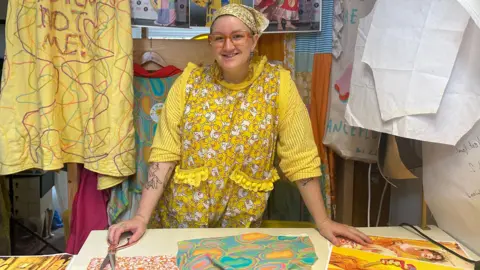 Zoe Dennis/BBC
Zoe Dennis/BBCA fashion student has used her own experience to create an adaptive fashion and accessory brand for disabled people to "make a change in the industry for the better".
May Gauntlett, 21, started her brand May Marigold over the summer with her designs recently appearing in an inclusive fashion tour.
The designer, from Norwich, noticed common issues when trying to look for accessible and adaptive clothing.
"I would avoid trying on clothing because changing rooms weren’t fitted for my needs in terms of adaptiveness and neither was the clothing," she said.
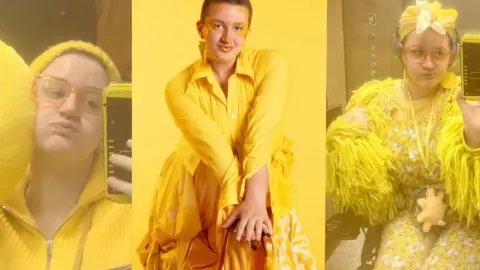 May Gauntlett
May GauntlettAdaptive clothing is clothing that is designed to fit around a person's dressing needs or stature.
"It may mean the clothing I make has an extra zip on the end to allow for the movement of prosthetics when dressing," Ms Gauntlett said.
According to the Research Institute for Disabled Consumers, 59% would buy more adaptive wear if it was available from mainstream retailers.
Some 62% of those living with a disability in the UK said it was difficult to find clothes they felt comfortable and happy in because of their disability, health condition or impairment.
Primark announced in January it was planning to offer accessible underwear in its shops, and George at Asda has an Easy On Easy Wear range for under-16s.
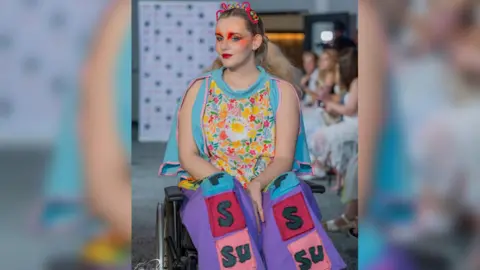 Alexandr Platniuc
Alexandr PlatniucMay was diagnosed with functional neurological disorder (which affects how the brain sends and receives information to/from the rest of the body), postural tachycardia syndrome (which affects the heart rate) and joint hyper mobility syndrome (very flexible joints) which can affect her ability to create clothing.
She set up her brand after getting a degree in fashion design from the Norwich University of the Arts, having moved to Norfolk from Brighton, and works out of a rented studio in Norwich.
"When I am creating wear, my dexterity is not where I'd like it to be… I can struggle with sewing as it requires a lot of hand movements and strength," she said.
"It’s a very time-consuming passion, but it's the passion that drives me to keep going."
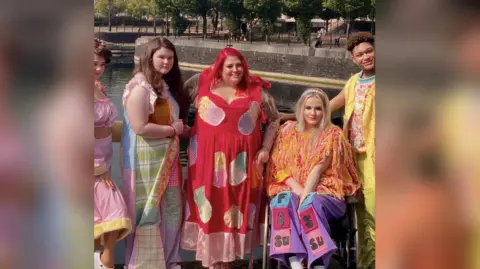 May Gauntlett
May GauntlettShe recently took part in The Inclusive Fashion Tour in Manchester, assisted by Bonnie Wood.
Ms Gauntlett said it was a huge moment seeing the designs on the models and the feedback was "overwhelmingly positive".
"Seeing the models' faces when they got to try something on, and it being easy for them to get into, was the highlight for me," she said.
"It's so simple how to include the adaptions needed and I think people are finally starting to feel seen by clothing, which I think is really powerful.
"It's allowed me to meet an amazing community of people with disabilities and learn about their struggles with fashion and how they want the industry to start including them."
The community interest company behind the tour reached out to Ms Gauntlett to take part as they were "so impressed with her use of unapologetic colour, and fun, funky designs".
"Fashion for disabled people is often overlooked, and some adaptive designs available can be very plain," the company said.
"We love the concept of disabled people who love to have fun with their fashion, being able to do that through May Marigold."
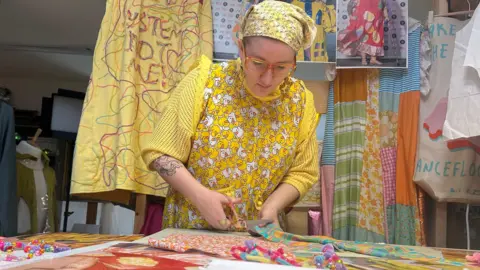 Zoe Dennis/BBC
Zoe Dennis/BBCMs Gauntlett said her message to the fashion industry would be to "include disabled people, think about the functionality of a design and how people with disabilities would put it on".
“I think this representation would have been life-changing for me when I was younger... it's important to remind people that the disabled community is a minority that anyone can join at any time as well," she said.
She only uses second-hand fabrics to make her designs and cannot remember the last time she bought something new.
"My clothing is priced at what people can afford; being a person with disabilities is extremely expensive with many extra costs already," she said.
"The big dream for me is seeing people in the disabled community embracing their individuality and being able to get dressed in the morning with a spark of independence.
"To see adaptive fashion walking down the High Street and being embraced by everyone."
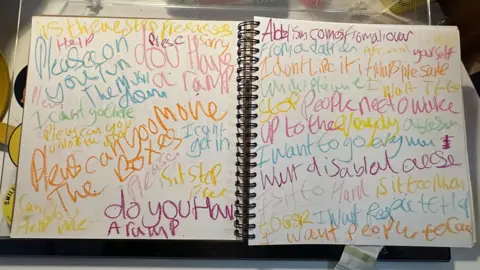 Zoe Dennis/BBC
Zoe Dennis/BBCFollow Norfolk news on BBC Sounds, Facebook, Instagram and X.
